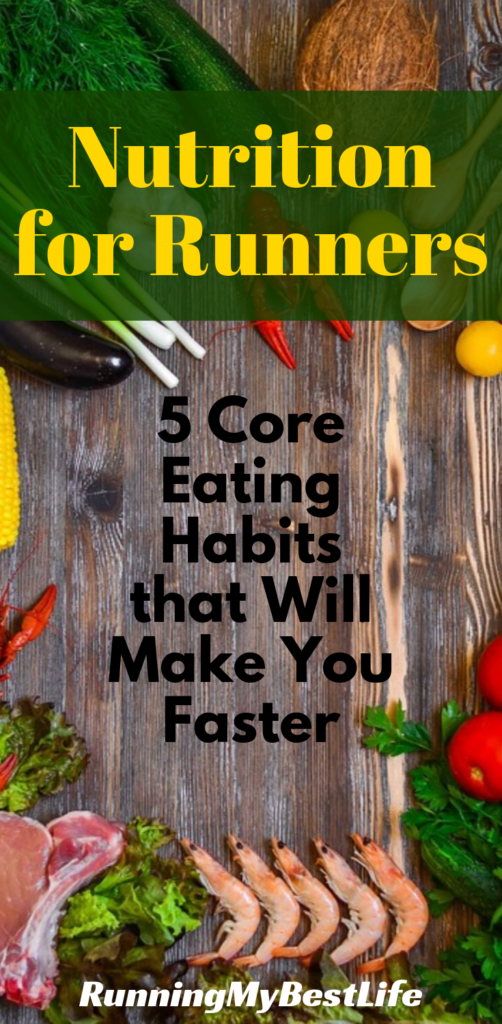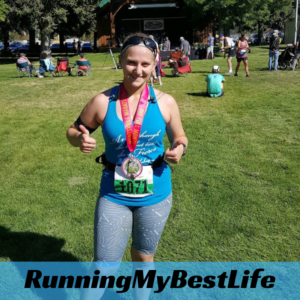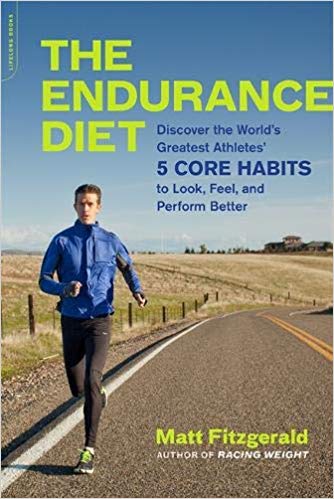Nutrition for runners around the world can vary quite a bit. But after extensive research, author and sports nutritionist Matt Fitzgerald found that there are actually 5 core habits the world’s greatest endurance athletes all share.
These core nutrition rules allow elite runners to fuel their training, achieve maximum performance, and even maintain a lean body. His book, The Endurance Diet, explains these habits and how to practice them in-depth.
Before I picked up a copy of The Endurance Diet, I read another Matt Fitzgerald book, Diet Cults, which broke down and debunked the effectiveness of all fad diets or supposed “healthy” ways of eating. After finishing Diet Cults, I was primed and ready for a way of eating and fueling my body that would be a true lifestyle change rather than just a temporary diet.
When I achieve my maximum fitness level and body composition, I want to be able to maintain it with relative ease. Thus, I’m not looking for a fad diet or “quick fix”. I want specific nutrition for runners that works and makes sense. Sustainable change takes time.

How did elite athletes from different parts of the world all converge on the same 5 core nutrition habits?
Quite simply, because they work.
Nutrition habits for runners evolve the same way different training methods evolve. Past generations of athletes experimented with all kinds of different methods to see what works. Eventually over the course of several decades, patterns emerge.
Elite runners train and eat a certain way, and then compete against each other. Then, the athletes that don’t win tend to look at the things they could tweak.
How did the winner eat and train for maximum performance?
Would that method help me?
So they try it. And when it works, the habits stick. Then when those athletes improve their performance by following winning habits, other athletes and coaches take notice and begin to emulate them.
This is how nutritional and training habits evolve in athletes.
[convertkit form=876847]
I’m not an elite athlete. Why should I eat the same way the pros do?
You’re probably thinking, “There is no way I would handle 100+ miles of training every week, so why should I eat the same way athletes eat if I can’t train like them?”
Volume can vary. You might not be able to run 100+ miles in a week, but you can probably adopt the same 80/20 Training Principle that elite runners use. You might not be able to eat as many calories or consume the sheer volume of food elite runners do, but you can adopt similar habits for maximum results.
Fitzgerald sums up the sentiment plainly:
“The science is clear: elite and recreational endurance athletes are similar enough physiologically that the training methods that work for the pros are also most effective for the rest of us.”
Matt Fitzgerald, The Endurance Diet
What matters is the method. The same methods are most effective for both elite and recreational athletes because we are all human and our bodies all digest and process food the same way.
With diet, elite athletes have the goal of maximum performance. They aren’t just working to look good naked. They don’t practice the habits of Fitzgerald’s Endurance Diet because they can, they eat like this because they must. Since their goal is to win major international competitions, they need to be significantly leaner and fitter than they would if their only goal was to look good.
They cannot afford to be truly relaxed with their diet.
Recreational endurance athletes coached by Matt Fitzgerald adopted these nutritional principles and were able to lose weight WITHOUT compromising their performance.
“It’s a simple fact: if you want to become as healthy and fit as you can be given the amount of time you’re able to invest in your training, you need to eat like an athlete.”
Matt Fitzgerald, The Endurance Diet
The Five Key Nutrition Habits of Endurance Runners
- Eat Everything
- Eat Quality
- Eat Carb-Centered
- Eat Enough
- Eat Individually
These five habits are the result of generations of evolution among athletes. They represent the dietary conditions that are necessary for achieving the highest possible level of endurance fitness.
Next, I’m going to break down the tenants of each habit so you can incorporate them into your training plan. The Endurance Diet goes much more in depth on explaining each habit and providing numerous case studies on why each nutritional habit works.

Habit 1: Eat Everything
Eating everything doesn’t mean to eat everything in the grocery store.
Sorry—Oreo’s don’t fall into one of the categories!
Fitzgerald points out the six basic categories of high quality natural whole foods:
- Vegetables
- Fruits
- Nuts, seeds and healthy oils
- Unprocessed meat and seafood
- Whole grains
- Dairy
The great majority of elite endurance athletes consume all six of these high quality foods regular, and they don’t exclude any one type of food unless absolutely necessary. A diet that includes all six natural food groups is balanced, varied, and inclusive to supply necessary nutrients designed to support the stress of hard training.
He also outlines that there are four low quality food types:
- Refined grains
- Sweets
- Processed meats
- Fried foods
Endurance athletes don’t necessary exclude these food groups. They only indulge in a small treat here or there to minimize the impact on their diet. This flexibility allows them to keep the overall diet both enjoyable and SUSTAINABLE.
Recommended Running Nutrition Reads:
- The Endurance Diet
- Racing Weight
- The Endurance Training Diet & Cookbook
- The New Rules of Marathon and Half Marathon Nutrition
- Run Fast. Cook Fast. Eat Slow. Cookbook
- Roar
Habit 2: Eat Quality
Running nutrition habit number two is highly related to the first habit. Just because endurance runners eat everything, it doesn’t mean they eat the same amounts of everything. Here, they skew their diet heavily towards only high quality foods.
By skewing towards more nutrient dense foods, athletes are able to get more nutrition out of less calories. This helps maximize fitness while maintaining their optimal racing weight.
Habit 3: Eat Carb-Centered
Yay for carbs!!
No, really. Carbs have a very important place in the diet of endurance athletes (both elite and recreational) and should be treated as such.
Elite endurance athletes place high quality carbohydrate rich foods as the center of most meals and snacks. As the book outlines, there is a great deal of diversity in which foods professional athletes from different cultures rely on to meet their carbohydrate needs. Despite the differences in specific food choices, carbohydrates typically account for 60-80% of total calories in the diet of elite endurance athletes.
Since carbohydrates are the primary fuel for intense exercise, a healthy dose of carbs allows athletes to absorb their workout volume with less physiological stress AND get more benefits from their training. Carbs hold a valuable place in the nutrition habits of runners.
Habit 4: Eat Enough
Elite endurance athletes do not force themselves into inflexible calorie counts or portion size limits, nor do they eat less than necessary to satisfy their hunger. However, they also don’t mindlessly overeat like the majority of affluent societies do today. They consciously pay attention to hunger and satiety signals from their body and allow this to determine the amount of food they consume.
Eat enough, without overeating.
This habit is important to ensure you are consuming enough food to fuel your training and racing as a recreational athlete, without overdoing it.
This is the one habit that Fitzgerald suggests can be modified for short preseason weight-loss focus phases.
He recognizes that some athletes gain weight easily during the off-season and may need a phase of weight-loss focus before entering their next training cycle.
Fitzgerald suggests only a moderate daily calorie deficit of 300 to 500 calories during your weight-loss focus phase. Larger deficits results in more muscle loss and less fat loss. You also want to increase your protein intake to 30% of total calories while in a weight-loss focus phase. The key here is to keep this phase between two and eight weeks to shed excess body fat faster than possible during hard training.
With this, please recognize that you should not be perpetually in a weight-loss phase. Focus on losing weight for several weeks for a pre-determined period, and then shift and focus on performance.
It might take you more than one training cycle to get to your optimal racing weight (or your goal weight).
But that is OKAY!
Life is a journey, and so is fitness. Stop getting wrapped up in hitting a specific number by a specific date. Listen to your body and adopt healthy habits.
Habit 5: Eat Individually
Each athlete must be mindful and responsive to their own dietary needs. Each unique person has a unique situation. The diet that works best for one athlete might not work best for another. While you start to adopt these key nutrition habits for runners, think about what foods within this framework will work best for you.
Listen to your body and learn the patters of how different foods affect you and which ones serve you better than others. Over time, you will develop your own version of The Endurance Diet.
Adopting These Nutrition Principles for Runners in Your Life
The five habits will manifest in different food choices for different people. For example, I might prefer oatmeal and others might prefer a bagel or whole-wheat toast. That’s totally fine! Do what works for you and what you enjoy.
For me, I’ve learned that eating a small piece of dark chocolate after dinner keeps my sweet cravings at bay. On the flip side, I’ve also learned that eating salty chips and salsa wreaks havoc on my weight and leaves me feeling bloated for a few days.
You might have noticed similar patterns in the way your body responds to certain foods.
If you are interested in diving deeper into case studies, why these five nutritional habits are so effective, and how to incorporate them into YOUR life, I highly recommend grabbing a copy of Matt Fitzgerald’s book, The Endurance Diet.
Do you include every single one of these habits in your nutritional routine? Or are you missing one?

Run Happy,
Alexis
- Nailing Your Marathon Hydration Strategy: A Comprehensive Guide
- Conquering Marathons in the Cold: A Comprehensive Guide
- Harnessing the Power of Technology for Successful Marathon Training
- Mastering the Marathon: The Ultimate Guide to Nutrition and Training
- Ultimate Guide to the Top 5 Running Shoes for Beginners in 2023
About Me: I’m Alexis, Founder of RunningMyBestLife! I am an avid recreational runner, half marathoner, wife, dog mom, busy professional, downhill skier in Northern Utah. My mission is to help new enthusiasts fall in love with the sport of running. I believe that running is a catalyst to taking control of your life and living your best life by design. Learn More –>
